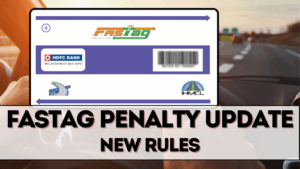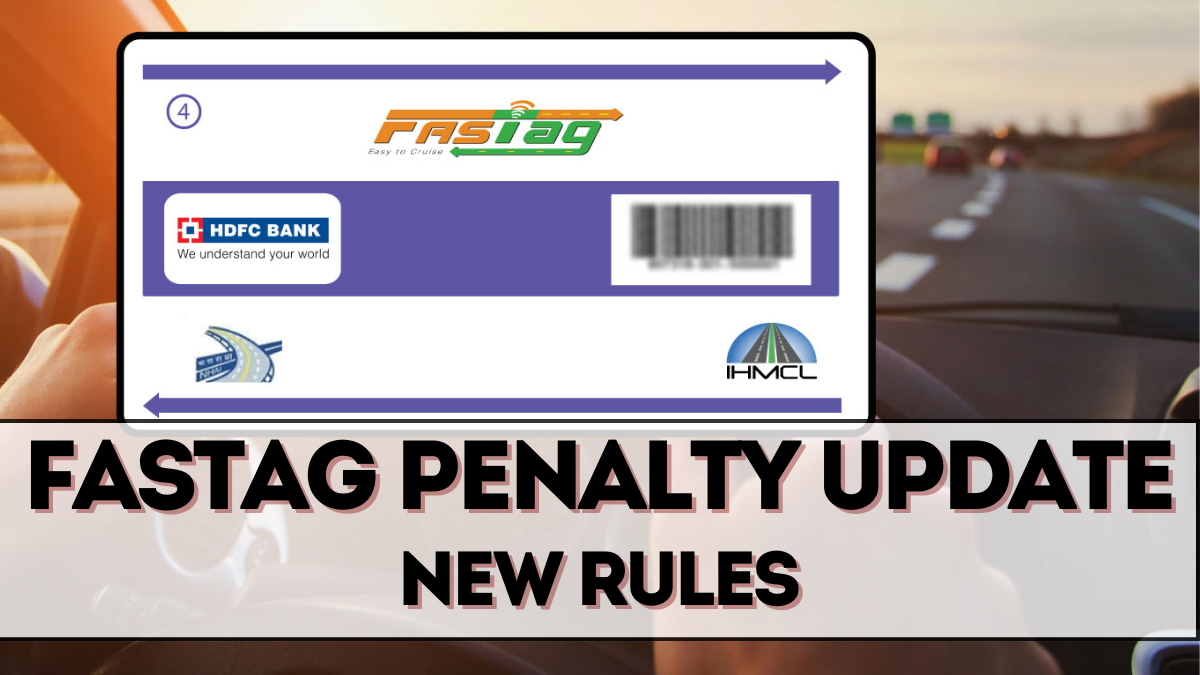The National Highways Authority of India (NHAI) has announced new rule changes for Fastag users, effective from September 2025. Originally set for August, the revised guidelines are now being enforced this month to improve compliance, prevent misuse, and make toll collection fully digital.
These updates are part of the government’s plan to strengthen electronic tolling and ensure seamless traffic movement on highways. With stricter penalties in place, vehicle owners must update their Fastag accounts immediately to avoid fines and disruptions.

Key New Rule Changes for September 2025
The updated Fastag framework introduces several major new rule changes that drivers need to know:
-
Mandatory KYC Update – All Fastag accounts must have valid KYC completed. Non-KYC accounts are being deactivated.
-
Single Vehicle Rule – One Fastag can only be linked to one vehicle. Using multiple vehicles with the same tag will attract penalties.
-
Inactive Fastags Blocked – Fastags that haven’t been used for over 6 months will be suspended until reactivation.
-
Penalty for Invalid Tags – Vehicles with expired, fake, or duplicate Fastags will be charged double toll fees.
-
Strict Monitoring at Plazas – NHAI has installed upgraded scanners to identify non-compliant tags instantly.
Together, these new rule changes create a tighter framework for toll collection, aiming to reduce fraud and speed up highway travel.
Why the Rules Were Updated
The government moved forward with these updates in September 2025 due to several issues:
-
Fraudulent tags – Some drivers were using cloned or duplicate Fastags.
-
Revenue leakages – Invalid or inactive tags caused revenue losses.
-
Traffic delays – Non-compliant vehicles slowed down toll plaza operations.
-
Digital India goals – The policy supports the aim of making tolling 100% cashless by 2026.
These new rule changes ensure smoother tolling and discourage misuse of the system.
Penalties Under the New Rules
From September 2025, Fastag penalties have been made stricter:
-
Double toll fees – Applied automatically for vehicles without valid Fastags.
-
₹5,000–₹10,000 fine – For using duplicate tags or transferring one Fastag across multiple vehicles.
-
Tag deactivation – Accounts without valid KYC or with repeated violations will be permanently blocked.
-
Blacklist status – Non-compliant vehicles may lose future discounts or face restrictions at tolls.
Drivers are strongly advised to update their tags before traveling long distances.
How to Stay Compliant
To avoid penalties, follow these steps to comply with the new rule changes:
-
Update KYC – Upload Aadhaar, PAN, and RC details on your issuing bank’s app or portal.
-
Check account linkages – Ensure your Fastag is connected to a valid bank account or prepaid wallet.
-
Verify single tag rule – Remove duplicate tags if you’ve linked more than one to the same vehicle.
-
Monitor balance – Always maintain a minimum balance to prevent rejection at toll plazas.
-
Use authorized issuers – Only purchase Fastags from banks or NHAI-approved sellers.
Compliance is quick, and the benefits include smoother travel and avoidance of heavy penalties.
Impact on Daily Commuters
The new rule changes will affect different categories of drivers:
-
Private car owners – Must ensure updated KYC and proper linking of their tags.
-
Commercial fleet operators – Larger fleets will need to update multiple accounts, making compliance crucial.
-
Highway commuters – Can expect faster toll clearance once the new system removes duplicate and fake tags.
-
Occasional travelers – Need to check their tags before long trips, especially if unused for months.
Overall, while compliance steps may feel strict, the payoff is better efficiency and fewer delays.
Benefits of the New Rules
The government believes these new rule changes will provide several advantages:
-
Faster traffic flow – Automated checks reduce bottlenecks at toll plazas.
-
Fraud prevention – Eliminates misuse of duplicate and inactive tags.
-
Greater transparency – Ensures toll revenue is collected accurately.
-
Consumer confidence – Reduces disputes and failed transactions.
This marks a step closer to India’s goal of smart highways and digital tolling.
Future of Tolling in India
Beyond the September 2025 update, the government is planning further improvements:
-
GPS-based tolling – Distance-based toll charges may replace plazas in the coming years.
-
Integration with transport systems – Unified cards for tolls, metro, and parking.
-
Fully automated highways – By 2026, NHAI aims to eliminate all manual toll booths.
This transition will make Indian highways more efficient and reduce cash dependency permanently.
FAQs
When will the new Fastag rules come into effect?
The new rule changes are effective from September 2025.
What happens if I don’t update KYC for my Fastag?
Your Fastag will be deactivated, and you will be charged double toll fees at plazas.
Can I use one Fastag for two vehicles?
No, under the new rule changes, each Fastag is linked to a single vehicle only.
What are the penalties for duplicate or fake tags?
Fines range from ₹5,000 to ₹10,000, along with tag deactivation.
Will traffic improve after these changes?
Yes, with invalid tags removed, toll plazas will see faster clearance and reduced congestion.
Click here to know more.
